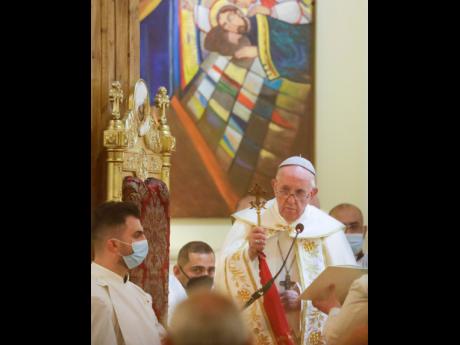Pope, top Shiite cleric deliver message of coexistence
PLAINS OF UR (AP):
Pope Francis walked through a narrow alley in Iraq’s holy city of Najaf for a historic meeting with the country’s top Shiite cleric, and together they delivered a powerful message of peaceful coexistence in a country still reeling from back-to-back conflicts over the past decade.
In a gesture both simple and profound, Grand Ayatollah Ali al-Sistani welcomed Francis into his Spartan home. Afterwards, he said religious authorities have a role in protecting Iraq’s Christians, and that Christians should live in peace and enjoy the same rights as other Iraqis. The Vatican said Francis thanked al-Sistani for having “raised his voice in defence of the weakest and most persecuted” during some of the most violent times in Iraq’s recent history
Al-Sistani, 90, is one of the most senior clerics in Shiite Islam, and his rare but powerful political interventions have helped shape present-day Iraq.
Later in the day, the pope met with Iraqi religious leaders in the shadow of a symbol of the country’s ancient past – the 6,000-year-old ziggurat in the Plains of Ur, also the traditional birthplace of Abraham, the biblical patriarch revered by Jews, Christians and Muslims.
Such interfaith forums are a staple of Francis’ international trips. But in strife-torn Iraq the televised gathering of figures from across the country’s religious spectrum was nearly unheard of: From Shiite and Sunni Muslims to Christians, Yazidis and Zoroastrians and tiny, lesser known, ancient and esoteric faiths like the Kakai, a sect among ethnic Kurds, Mandaeans and Sabaean Mandaeans. Missing from the picture was a representative of Iraq’s once thriving, now nearly decimated Jewish community, though they were invited, the Vatican said.
TOUGH SELL
Together, the day’s two main events gave symbolic and practical punch to the central message of Francis’ visit, calling for Iraq to embrace its diversity. It is a message he hopes can preserve the place of the thinning Christian population in the tapestry.
Still, it faces a tough sell in a country where every community has been traumatized by sectarian bloodshed and discrimination and where politicians have tied their power to sectarian interests.
In al-Sistani, Francis sought the help of an ascetic, respected figure who is immersed in those sectarian identities but is also a powerful voice standing above them.
Their meeting in al-Sistani’s humble home, the first ever between a pope and a grand ayatollah, was months in the making, with every detail painstakingly negotiated beforehand.
Early Saturday, the 84-year-old pontiff, travelling in a bullet-proof Mercedes-Benz, pulled up along Najaf’s narrow and column-lined Rasool Street, which culminates at the golden-domed Imam Ali Shrine, one of the most revered sites in Shiite Islam.
He then walked the few metres down an alley to al-Sistani’s home. As a masked Francis entered the doorway, a few white doves were released in a sign of peace. He emerged just under an hour later, still limping from an apparent flare-up of sciatica nerve pain that makes walking difficult.
A religious official in Najaf called the 40-minute meeting “very positive”.
In a statement issued by his office afterwards, al-Sistani affirmed that Christians should “live like all Iraqis, in security and peace and with full constitutional rights”. He pointed out the “role that the religious authority plays in protecting them, and others who have also suffered injustice and harm in the events of past years”.
Al-Sistani wished Francis and the followers of the Catholic Church happiness and thanked him for taking the trouble to visit him in Najaf, the statement said.
Iraqis cheered the meeting, and the prime minister responded to it by declaring March 6 a National Day of Tolerance and Co-existence in Iraq.
Later, Pope Francis evoked the common reverence for Abraham to speak against religious violence at the inter-faith gathering at the Plains of Ur, near the southern city of Nasiriyah.
“From this place, where faith was born, from the land of our father Abraham, let us affirm that God is merciful and that the greatest blasphemy is to profane his name by hating our brothers and sisters,” Francis said. “Hostility, extremism and violence are not born of a religious heart: they are betrayals of religion.”
The Vatican said Iraqi Jews were invited to the event but did not attend.

